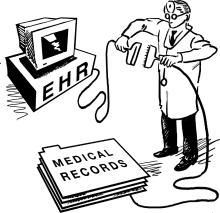Difference between revisions of "Electronic Health Records"
(→Ethical Issues) |
(→Ethical Issues) |
||
| Line 10: | Line 10: | ||
==Ethical Issues== | ==Ethical Issues== | ||
| − | Electronic Health Records allow healthcare providers access to a comprehensive medical history of their patients in order to provide them with better care. EHRs are meant to improve healthcare through improved flow of patient information to medical professionals and ethical issues arise when non-health care providers gain access to patient information. These large databases of patients' medical history are more prone to outside access and in turn can cause the unethical exposure of personal health information<ref>http://dl2af5jf3e.search.serialssolutions.com/?ctx_ver=Z39.88-2004&ctx_enc=info%3Aofi%2Fenc%3AUTF-8&rfr_id=info:sid/summon.serialssolutions.com&rft_val_fmt=info:ofi/fmt:kev:mtx:journal&rft.genre=article&rft.atitle=Third+party+access+to+shared+electronic+mental+health+records%3A+ethical+issues&rft.jtitle=Psychiatry%2C+Psychology+and+Law&rft.au=McSherry%2C+Bernadette&rft.date=2004-04-01&rft.pub=Australian+Academic+Press+Pty.+Ltd&rft.issn=1321-8719&rft.volume=11&rft.issue=1&rft.spage=53&rft.externalDBID=n%2Fa&rft.externalDocID=121082132</ref>. That is to say patients' right to privacy is more | + | Electronic Health Records allow healthcare providers access to a comprehensive medical history of their patients in order to provide them with better care. EHRs are meant to improve healthcare through improved flow of patient information to medical professionals and ethical issues arise when non-health care providers gain access to patient information. These large databases of patients' medical history are more prone to outside access and in turn can cause the unethical exposure of personal health information<ref>http://dl2af5jf3e.search.serialssolutions.com/?ctx_ver=Z39.88-2004&ctx_enc=info%3Aofi%2Fenc%3AUTF-8&rfr_id=info:sid/summon.serialssolutions.com&rft_val_fmt=info:ofi/fmt:kev:mtx:journal&rft.genre=article&rft.atitle=Third+party+access+to+shared+electronic+mental+health+records%3A+ethical+issues&rft.jtitle=Psychiatry%2C+Psychology+and+Law&rft.au=McSherry%2C+Bernadette&rft.date=2004-04-01&rft.pub=Australian+Academic+Press+Pty.+Ltd&rft.issn=1321-8719&rft.volume=11&rft.issue=1&rft.spage=53&rft.externalDBID=n%2Fa&rft.externalDocID=121082132</ref>. That is to say patients' right to privacy is more susceptible to violation, which raises the question if the benefits of EHRs are worth this potential violation. |
==Advancements== | ==Advancements== | ||
Revision as of 01:58, 28 November 2011
Electronic Health Records (EHR) are a digitized form of a health record, used in health systems to collect, store, edit, and transfer patient information. EHRs provide a universal location of all information and history of a patient regardless of region or facility. EHRs are owned by the patient and allow patients to access and edit his or her information. In the coming years, healthcare systems hope to overtake or work in addition to its paper counterpart by providing a universal location for “virtually every facet of clinical information pertinent to patient care.”EHRs should not be confused with Electronic Medical Records (EMR) or Patient Care Records (PCR), which are a computerized record from a single facility. They are not universally shared and may not allow the patient access to his or her information. However, the EHR relies heavily on EMRs in order to attain patient information and must seek permission from the healthcare facilities.
History
Electronic Health Records were developed from Patient Care Record systems. PCR systems began to emerge in the 1960s under the John F. Kennedy presidency. The Lockheed Corporation received a large amount of government grant money for the NASA space program at the beginning of the sixties. The money was to be used for space technology under the stipulation that it be extended it to the common good of society. Lockheed had the idea to develop a computer program that managed patient care. Lockheed presented their idea to El Camino Hospital in Mountain View, Ca in 1968 who agreed to pursue the project. Lockheed industrial engineers spent the next two to three years analyzing the patient data flow in the hospital in order to understand how to build an effective infrastructure for the patient care application[1]. El Camino Hospital began using the program in 1973 on IBM computers. Similar programs began to spread to other hospitals during the 1970s. Some of these projects included IFAS and Medpeo, PCS/ADS, and SMS. These PCR programs were very limited. They were able to send orders and share and gather results. During the 1980s other companies began to develop additional PCR systems, but many of them went out of business. By the end of the decade the Lockheed program was the only functioning system[2]. Computer network technology emerged and computing costs started to decline in the 1990s, which facilitated the expansion and further development of CPR systems. By the mid 1990s many out patient clinics and physician practices were using EHR technologies. Leading companies during this period were Compaq, Hewlett Packard, Data General, Cerner, HBOC, Meditech, TDS, IBX, and EPIC. Many of these companies created these technologies to fulfill specific needs of particular facilities, which in turn made it difficult to commercialize their systems[2]. Today many EHR systems exist and are used in many medical facilities. However, many facilities are only just beginning to utilize these systems or have very rudimentary forms of EHR.
Ethical Issues
Electronic Health Records allow healthcare providers access to a comprehensive medical history of their patients in order to provide them with better care. EHRs are meant to improve healthcare through improved flow of patient information to medical professionals and ethical issues arise when non-health care providers gain access to patient information. These large databases of patients' medical history are more prone to outside access and in turn can cause the unethical exposure of personal health information[3]. That is to say patients' right to privacy is more susceptible to violation, which raises the question if the benefits of EHRs are worth this potential violation.
Advancements
References
- ↑ http://www.springerlink.com/content/u83kt1k4142k6550/
- ↑ 2.0 2.1 http://vimeo.com/12202874
- ↑ http://dl2af5jf3e.search.serialssolutions.com/?ctx_ver=Z39.88-2004&ctx_enc=info%3Aofi%2Fenc%3AUTF-8&rfr_id=info:sid/summon.serialssolutions.com&rft_val_fmt=info:ofi/fmt:kev:mtx:journal&rft.genre=article&rft.atitle=Third+party+access+to+shared+electronic+mental+health+records%3A+ethical+issues&rft.jtitle=Psychiatry%2C+Psychology+and+Law&rft.au=McSherry%2C+Bernadette&rft.date=2004-04-01&rft.pub=Australian+Academic+Press+Pty.+Ltd&rft.issn=1321-8719&rft.volume=11&rft.issue=1&rft.spage=53&rft.externalDBID=n%2Fa&rft.externalDocID=121082132
